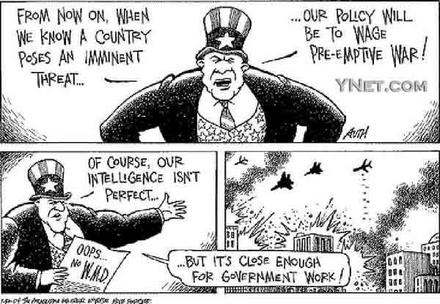[hide]">
align=center>图片加载中,请稍候....
①当然,我们的情报并不百分之百的准确
②唉,没有大规模杀伤性武器
③……但对政府来说已经足够了 Most Americans agree that a nation that has suffered an outrage at the hands of another may retaliate if that is the course of action most likely to discourage a repetition. But what if the outrage is still in the planning stages? What if the evil planned is truly colossal, or may even make retaliation impossible? What if the consequences of an evil act, say the blowing up of a civilian airliner by terrorists, include economic hardship or ruin for an international industry like tourism? The Bush administration believes that the US is entitled to take preemptive action against imminent nuclear threats or against terrorists with big plans. But there are clearly serious problems with the opinion. First, is America really entitled to act alone? Second, doesn't the assessment of such threats tend to involve multiple interpretations of shaky evidence? Third, can any regime play this game? Observers like American Tony Auth are appalled by George Bush's apparent indifference to these concerns. In today's cartoon he portrays a Bush-era Uncle Sam, portly, domineering and suggestive of a senior corporate type, loudly announcing current policy. This Texan figure admits that US intelligence (or the interpretation of it in Washington) isn't always accurate -- hence the lack of weapons of mass destruction in an Iraq that was supposedly bristling with them. But the data are "close enough for government work", which we see in frame 3 includes the dropping of bombs on cities. The US government gives R&D or purchase contracts to countless firms and has a reputation for sloppy oversight of the results. This has worked to the advantage of big corporations, which notoriously overbill the taxpayer if they think that, often in collusion with bureaucrats, they can get away with it. "Close enough for government work" is a cynical expression meaning not terribly accurate. It is one of many turns of phrase expressing the widespread mistrust of government (or contempt for it) that is deeply enrooted among Americans. Here, though, it is being used by an emblem of the government itself. Is the current government overrun with cynics? So Tony Auth seems to think.
布什政府:我们要先发制人!(图)
大多数美国人都同意遭受异国暴行的国家可以反击,倘若反击是最能抑制暴行重演的一种选择。但是,如果暴行尚在筹划阶段该当如何?如果筹划中的邪恶力量将会大得惊人以致无法反击又该当如何?如果邪恶行为(例如一架民用飞机被恐怖分子炸飞)造成的后果还包括了给某一国际领域(如旅游业)带来经济困窘或经济衰退,又该当如何? 布什政府相信,美国政府有权采取先发制人的行动,抵御迫在眉睫的核威胁或是有着野心勃勃计划的恐怖主义分子。但这一看法存在着极为严重的问题。首先,美国真的有权力单独这样做吗?第二,这类威胁的评估难道不是常常包含着对不可靠证据所做的多种解释吗?第三,任何一个国家都可以这样做吗? 布什对这些问题的明显漠视,使得像美国漫画家托尼·奥特这样的观察者极为震骇。他在今天的这幅漫画中画出了布什时代的山姆大叔:挺胖,飞扬跋扈,并且暗指这是一个商界高层管理人员,他正高声宣布当前的政策。这个得州派头的人物承认美国情报(或者说华盛顿对情报的解释)并非总是准确———因此在曾经认为充斥着大规模杀伤性武器(WMD)的伊拉克并没有找到WMD,但是情报“对政府来说已经足够精确了”,我们在第三栏中看到这句话,还看到飞机把炸弹投向城市。 美国政府将研发合同或购买合同给了不计其数的公司,但却有着对执行结果疏于监督的坏名声,这对那些大公司可是有好处的。众所周知,当这些公司认为能逃避惩罚时(他们往往与政府官员相勾结),就会挥霍纳税人的钱。“对政府来说已足够精确”是一个嘲讽的说法,意思是“并不精确”,它是广为流传的对政府表示不信任(或蔑视)并且深深植根于美国人当中的很多说法中的一个。而在这幅漫画里,美国政府的象征山姆大叔自己也用上了这句话,那么在当今的美国政府中是否充斥着对政府不信任且对其冷嘲热讽的官员呢?看来奥特是这么认为的。
[/hide]
关键字:双语新闻,中英文对照 |